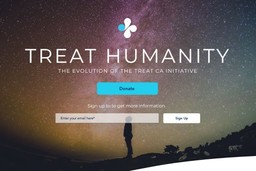In September 2023, we interviewed Jeannie Fontana, Founder and CEO of TREAT California, an impactful citizen-driven ballot initiative for mental health empowerment. A couple of months following the interview, TREAT California stated it was withdrawing from its 2024 ballot initiative efforts. It’s ending its signature-gathering process and reshifting attention to TREAT Humanity.
We followed up with Jeannie to talk about the pivot of TREAT California. We discussed what happened, why it happened, and her plans for its future. She clarified and responded to some of the criticism that the psychedelic community had about TREAT California. Lastly, she explained what TREAT Humanity is and highlighted its focus and differences.
What happened to TREAT California?
TREAT California was a citizen-driven ballot initiative to create a $5 billion funding agency. It worked to address mental health by using psychedelic medicines safely, responsibly, and ethically. We asked Jeannie about what happened in the weeks leading up to their decision to withdraw.
Jeannie first wanted to express the incredible momentum supporting the project:
“It was clear from our grassroots efforts in front of the people of California that there’s such a desperate need and so much enthusiasm. I was not aware of how successful this was, but in a short period of time, we have 3,000 active volunteers.”
The Attorney General’s Draft Ballot Language
Jeannie explained that part of the ballot initiative process in California is to submit the legislation to the Attorney General’s office. The AG reviews it and then drafts the language that is included on the ballot. This would be what voters in California would read.
Therefore, the language on the ballot is critical and can be written positively, neutrally, or negatively. As soon as they received the language, they polled it. Jeannie disclosed that it was David Bronner, CEO of Dr. Bronner’s, who stepped in financially and helped fund this poll.
She shared some of the AG’s draft ballot language:
“…authorizes bonds and creates a state agency for psychedelic therapy research, initiative constitutional amendment and statute…creates a state agency to regulate “psychedelic medicines” (defined as substances that produce altered states of consciousness, including psilocybin, LSD, mescaline, MDMA, ketamine and cannabis).”
Jeannie expressed that she views these sentences very negatively. However, the language after became more positive.
“…requires the agency to provide funding for research, development, and delivery of psychedelic medicines and therapies for treatments of mental health conditions and health disorders, including anxiety, depression, and PTSD.”
The final portion of the language stated the following:
“…estimated by the legislative analysts of directors of finance, fiscal impact on state and government agencies at an average cost of about $220 million each year for 30 years, where the total cost of $6.6 billion over $30 years.”
Ballot Language Polling Results
The results of the poll showed that 45% do not support establishing a state government agency to deliver new therapies using psychedelics. Conversely, 60% oppose state funding for these therapies. Jeannie was devastated.
“It’s in my opinion that we got the most negative interpretation of our legislation…a lot of them said they voted no because they didn’t believe a state agency could use the money properly.”
Why did TREAT California withdraw from the ballot initiative?
In November, TREAT California released a statement announcing that they were withdrawing from their ballot initiative. We asked Jeannie to break down how the gut-wrenching decision was made.
Costs of Shifting to a Yes Vote
Jeannie explained that it would require at least $30 to $50 million to move to a yes vote. There was a portion of Republicans who would vote no, no matter what they said or did. There was a portion of the Democrats who would vote yes no matter what they said or did.
Therefore, it would require a well-run campaign that reached the people in the middle. She shared that the people in the middle are very wary of a government agency being able to deliver on its campaign promise.
Jeannie spoke about the financial costs of running a campaign to change voter’s opinions.
“In order to reach those people, you have to pay media, canvas, and all these things takes a lot of money to get us to a yes vote.”
Negative Draft Ballot Initiative Language
Jeannie was paying for the signature-gathering portion. She shared that there’s an overwhelmingly positive opinion on psychedelic medicine in the state of California and the country.
She thought that all they needed to do was get on the ballot. This, of course, was provided that they had some favorable or neutral language from the AG’s office. However, Jeannie believes the AG’s negative draft ballot initiative language limited the possibility of a yes vote—without a well-funded campaign.
Lack of Funding for a Campaign
Unfortunately, due to the negative polling results, David Bronner told Jeannie he couldn’t fund it. She couldn’t either.
“I don’t have $30 million to plan. And I also feel that this needs to come from the people, not just me. This is not me. This is for the people.”
Jeannie still can’t believe she was able to build the momentum that she had. However, she felt the people needed to contribute their time, energy, or money, and it just didn’t happen.
“We had to pull out because I couldn’t continue spending that money without having more money to run a successful campaign.”
US Citizens’ Historically Low Confidence in Government Institutes
Jeannie spoke about part of the reason why TREAT California withdrew. This was because of the current lack of confidence that American citizens had in government institutes. It’s at a historical low.
“[The level of confidence] hasn’t been this low for decades.…it goes back down to 1941…that amount of disgust [that citizens have] with the way our government is operating was a hurdle. I think it is surmountable, but we need more time and money to address that.”
Future Plans for TREAT California: “We are considering running again in 2026.”
We asked Jeannie what the plans were for TREAT California. She stated that they are considering running again in 2026, depending on the political environment. Jeannie shared that because they have developed a robust coalition of support, they want to continue their efforts. It will give them time to educate the citizens of California. She expressed that there are many obstacles ahead.
“There’s lots of potholes and landmines that can happen between here and there, that we will assess. It depends upon whether the federal government supports MDMA. Or there’s a drug company that comes out. Or there’s a decriminalization or legalization bill that gets passed…To safely roll this out to the public would be of the political will of the citizens, depending upon which issues are being approved.”
Starting TREAT Humanity: “This is not only a US issue; it’s a global issue.”
Jeannie shared that while withdrawing from their ballot initiative, it became clear to her that the goal of TREAT California is not only a US issue; it’s a global issue. She thought that it was about treating humanity.
Removing The Political Vehicle in TREAT California
She explained how donations were structured. TREAT California was a 501(c)(4) Organization as a political vehicle and its challenges.
“Donors needed to disclose their name and their input. For any donation over $25, we had to disclose their name. For any donation over $100, we had to disclose their work address and their title at work. A lot of donors weren’t interested in disclosing that information, and they didn’t believe that a government institution could deliver on its promise.”
Jeannie thought since the government agency was the problem, TREAT Humanity would not be a political organization. It would be a nonprofit.
“[TREAT Humanity] can get received tax-deductible donations, and we don’t have the optics of campaign finance law which are cumbersome at best.”
The Focus of TREAT Humanity
Jeannie talked about TREAT Humanity’s focus. She wanted to emphasize she is currently regrouping with her team and exploring the best paths forward. They are still doggedly determined to help bring plant medicines to the public in a safe, responsible, and ethical way.
TREAT Humanity is continuing with the mission of TREAT California. This mission? To help build the psychedelic ecosystem to deliver much-needed treatment and care for the millions and millions suffering.
Gavin Newsom’s Mental Health Care Bill: “We would love to be included.”
Jeannie expressed that they would love to be included in Gavin Newsom’s mental health care bill. This will be introduced to the voters in March 2024.
“He has a $6.5 billion mental health care bill that he’s presenting to the voters under which he’s planning to open up a bunch of mental health care clinics throughout California, as well as training some people.”
Jeannie believes this is a good start in addressing the shortage of mental health care workers. That said, she thinks it’s important to provide mental health care providers with a new tool. Specifically, she mentioned that the TREAT Institute agenda wanted to train at least 200,000 psychedelic-assisted therapists.
Safe and Responsible Approach To Deliver Plant Medicines
Jeannie shared one of the focuses for TREAT Humanity—to come up with a safe, responsible approach to delivering plant medicines. She described some things that need to be in place for this to occur:
- Safety System: This is similar to a risk stratification for patients. Not everybody should be taking these medicines. They can help a lot of people, but they can also be destabilizing for some people.
- Community Care: It would be important to build an extended connection with the patient through community care. A patient who undergoes psychedelic therapy isn’t on their own afterward. They have a safe system to lean on.
- Safety and outcome tracking: Some people are microdosing with psilocybin and saying they are safe. However, it’s important to look at large-scale population use and track outcomes.
- Understanding dosing and frequency: Each person comes with a different emotional history that providers need to be able to accommodate. It’s important to understand the frequency and dosing of plant medicines. It’s not appropriate to follow a model where each person receives the same treatment paradigm.
- Different therapeutic indications: One patient may do well in a supervised medical facility. However, other methods may be appropriate such as group therapy, ceremonial therapy, and religious ceremonies. It’s important to track how these work and their quality of care and then make them safe as they expand.
- Effective Access Care Model: This cannot be only available to those who can afford treatment or those who have insurance. Every patient needs to have access to these medicines, not just the rich people.
Jeannie shared that it would be a dream come true if the federal government were to roll out a program where everybody in the country could start undergoing psychedelic research programs and training programs so that everybody has access.
Addressing Criticism of TREAT California: Conflicts of Interest
We asked Jeannie to address some of the critiques about TREAT California. Specifically, there were concerns about conflict of interest. How it was going to be financially managed was also raised since money was coming from public and private sources.
“There is nothing to do with patents.”
Jeannie emphasized that TREAT California was going to start off funding non-patentable medicines.
“These medicines [mesescaline, ibogaine, DMT, and LSD] have been around for decades if not thousands of years. They’re not patentable, and we know that they seem to be beneficial. Those are what we’re looking at. So there’s nothing to do with patents or anything.”
“We need money to support basic research.”
She explained that part of what TREAT California is rolling out besides treatment was to get studies to validate and verify the safety, effectiveness, and indications.
“[TREAT California would support] basic research for not just mental health issues [but also] inflammatory diseases, traumatic brain injury and asthma and air mobile disease. We need money to support basic research and allow scientists and researchers to follow where science takes them. Not the philanthropist-driven model.”
“Creating a safe community for those who are just beginning their healing journey.”
Jeannie emphasized that it was important for TREAT California to train therapists. Not only in delivering psychedelic therapy and plant medicines but also in creating a community for patients.
“[A patient] doesn’t just do this therapy, gets discharged, and they’re gone forever. No, they need to be part of the community. And that takes money and effort.”
“Access is important.”
Jeannie shared that she wants every citizen in California to have access to these medicines—regardless of their ability to pay. This requires them to determine whether it is cost-effective.
“We have to track health care economics…to know if these [treatments] are cost-effective and if they improve outcomes over time.”
“Capitalism under the right circumstances is actually beneficial.”
There are financial costs to getting access for everyone. Jeannie explained that one way of offsetting some of these costs and improving the whole space is embracing the industry.
“[W]e live in a capitalistic society and capitalism under the right circumstances is actually beneficial. It’s a driver for creativity and ingenuity.”
“For example, Company X develops a derivative of psilocybin that has a half-life of one hour.”
Jeannie gave an example of how leveraging capitalism could work for psilocybin, a non-patentable psychedelic therapeutic.
This is assuming studies are completed. FDA approval is received. The non-patentable psilocybin treatment is rolling out to patients. This requires a patient to spend 10 hours with a therapist. This is a lot for the patient and for the therapist. The patient has kids at home. They have to take two or three days off to go to therapy. It’s a lot.
Company X develops a derivative of psilocybin that has a half-life of one hour. This would add incredible value to the therapeutic space. The patient would now only need to spend one hour instead of taking days to complete treatment.
The TREAT Institute would look at the preliminary data of Company X. It would have the infrastructure to validate and verify the product for safety and effectiveness. If the product meets all the requirements, then they would facilitate the FDA approval.
“We would act like a private equity company.”
Jeannie explained that the TREAT Institute would act like a private equity company. Private equity companies invest in startups and take a big piece of equity.
If Company X makes it through the FDA approval process, the TREAT Institute would get to decide what they want to charge. They would negotiate with insurance companies and decide what that cost is for the people who are taking the product. The TREAT Institute would be interested in improving patient outcomes and ensuring it is cost-effective and accessible to all. For instance, they could take a 5% to 15% licensing fee, similar to an academic institution.
“We could take a flat revenue tax.”
Jeannie added that they could also charge a flat tax on revenue for Company X. This would be after they’ve been validated, verified, and received FDA approval.
“We could take a flat tax on [Company X’s] profit, negotiating best terms, pricing for California citizens, and the last thing that we would do is consider taking equity in their company.”
“Acting like a private equity company would be a way to keep it evergreen and offset the expenses of the TREAT Institute.”
Jeannie explains that equity goes back into the TREAT Institute to offset the expenses of getting this treatment available to every citizen of California. She wanted to clarify that TREAT Institute’s North Star is not priced for share value like the industry. The industry only cares about financial returns.
“[TREAT Institute’s] North Star is written in the legislation which are improved patient outcomes, cost-effective and accessible to all. I believe that we will show over time that these medicines are effective. They save us money, and we make it accessible to all, but that takes money to get to that.”
She shared that the TREAT institute has monies allocated towards a whole division focused on healthcare economics. This allocation is to track direct and indirect expenses associated with mental illness. It would show over time whether these treatment paradigms were working for people and saving money.
Jeannie stressed that until they’re able to have that data and make treatments accessible to all, they had to have ways to keep the institute evergreen.
“It can’t be going back to the voters all the time saying now we need an additional $5 billion. I believe our milestone metrics have to be met. We put in the TREAT Institute agenda that if we didn’t meet our first milestone, safety and efficacy, we would stop funding. We’re done.”
“I’m not doing this to make money.”
Lastly, Jeannie wanted to inform the critics that she was not doing this to make money.
“I’m not there to spend the government’s money. I’m not a politician. I’m not doing this to make money. I’m doing this because of my skill sets that can actually affect positive change. I have been so blessed and fortunate to live where I live, be educated, and be part of a successful road map with the stem cell agency (California Institute of Regenerative Medicine).”
How to Support TREAT Humanity
We ended our conversation on how others can support the evolution of the TREAT Humanity initiative.
“My dream come true would be to engage a series of high-net-worth individuals who are entrepreneurs who care about affecting positive change. [I want us] to come together and introduce a new paradigm of how mental health care is delivered in America. I need people who are change-makers who want to give back to the community. This is not about your ego or making money. You can make some money along the way, but it’s about helping for the greater good.”
You can support TREAT Humanity through the following:







